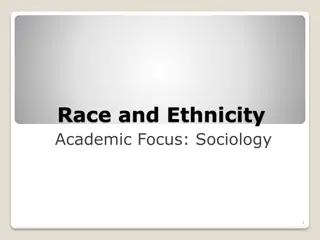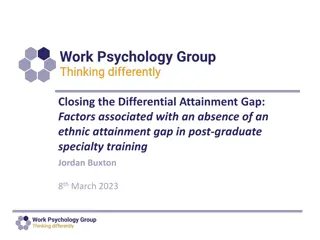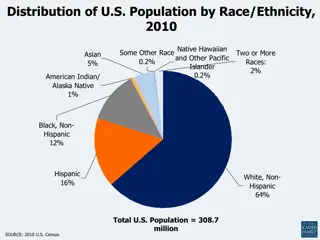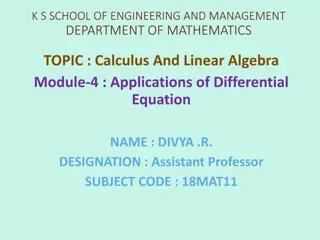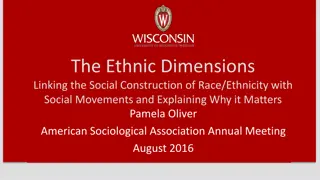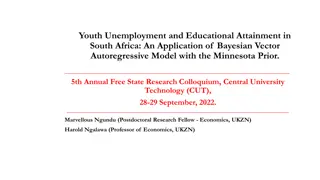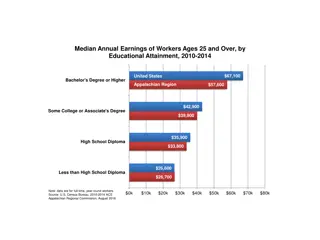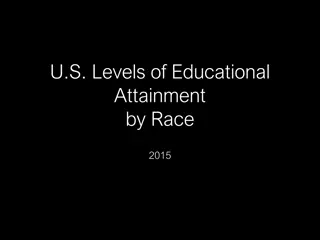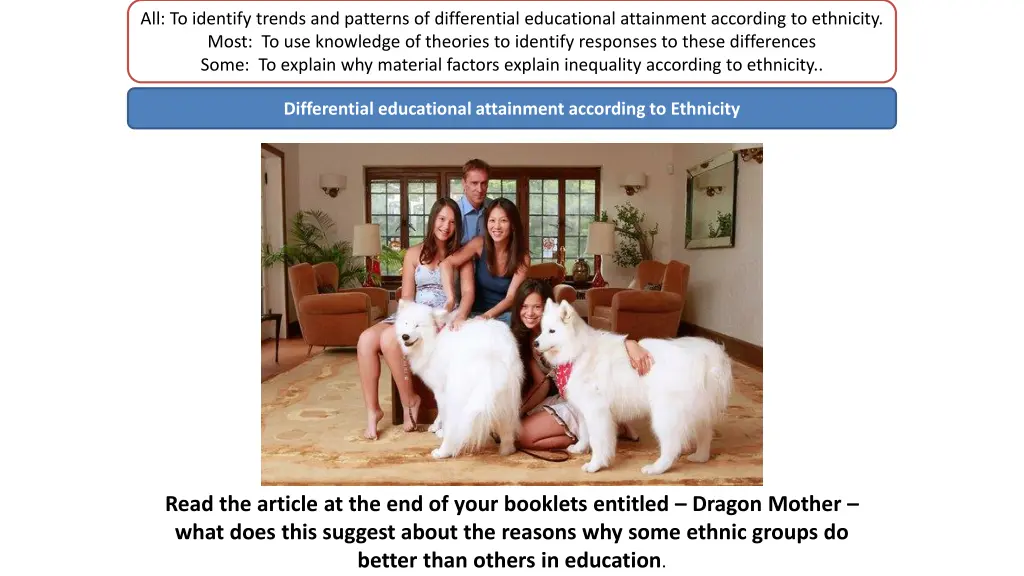
Understanding Trends in Differential Educational Attainment by Ethnicity
Explore the complexities of educational attainment differences across ethnicities, analyzing various factors such as material, cultural, and in-school influences. Delve into the reasons behind varying success rates among different ethnic groups and examine evidence of closing gaps in educational achievement.
Download Presentation

Please find below an Image/Link to download the presentation.
The content on the website is provided AS IS for your information and personal use only. It may not be sold, licensed, or shared on other websites without obtaining consent from the author. If you encounter any issues during the download, it is possible that the publisher has removed the file from their server.
You are allowed to download the files provided on this website for personal or commercial use, subject to the condition that they are used lawfully. All files are the property of their respective owners.
The content on the website is provided AS IS for your information and personal use only. It may not be sold, licensed, or shared on other websites without obtaining consent from the author.
E N D
Presentation Transcript
All: To identify trends and patterns of differential educational attainment according to ethnicity. Most: To use knowledge of theories to identify responses to these differences Some: To explain why material factors explain inequality according to ethnicity.. Differential educational attainment according to Ethnicity Read the article at the end of your booklets entitled Dragon Mother what does this suggest about the reasons why some ethnic groups do better than others in education.
All: To identify trends and patterns of differential educational attainment according to ethnicity. Most: To use knowledge of theories to identify responses to these differences Some: To explain why material factors explain inequality according to ethnicity.. Differential educational attainment according to Ethnicity Evidence of differential attainment: Read the information on pages 131-134 of the textbook. 1. Explain why it is difficult to make judgements about differential educational attainment by ethnicity. 2. For each of the 3 stages of education (GCSE, post 16, higher education), note down the 3 most important points. 3. Explain evidence that the gap between ethnic groups in terms of educational attainment is closing. 4. Explain the link between ethnicity and gender 5. Explain the link between class and ethnicity 6. Explain the evidence that there is a level of white British under achievement
All: To identify trends and patterns of differential educational attainment according to ethnicity. Most: To use knowledge of theories to identify responses to these differences Some: To explain why material factors explain inequality according to ethnicity.. Material / Cultural / In school factors: Use the information in your textbook, in the photocopy and from your notes to draw up a fact sheet about why material / Culture / In school factors might lead to differential educational attainment according to ethnicity. Your fact sheet must include: Evidence that ethnic attainment is linked to material / cultural / in school factors, Reasons why material / cultural / in school factors might explain ethnic inequality, Sociologists/theories who argue this Any opposing evidence if possible. Identify FOUR themes that you would discuss (and what evidence you d use in support of these themes)
All: To identify trends and patterns of differential educational attainment according to ethnicity. Most: To use knowledge of theories to identify responses to these differences Some: To explain why material factors explain inequality according to ethnicity.. Material / Cultural / In school factors: FEEDBACK: 1)Explain your factor to your group. 2)Complete the supporting evidence column on each table. 3)Work in your groups to identify EVALUATIVE points for each of your supporting points. Write these in your challenge column. Ensure that you have a study for each. 4)Stick all copies of the fact sheets.
All: To identify trends and patterns of differential educational attainment according to ethnicity. Most: To use knowledge of theories to identify responses to these differences Some: To explain why material factors explain inequality according to ethnicity.. Material / Cultural / In school factors: Use the information in your textbook, in the photocopy and from your notes to draw up a fact sheet about why material / Culture / In school factors might lead to differential educational attainment according to ethnicity. Your fact sheet must include: Evidence that ethnic attainment is linked to material / cultural / in school factors, Reasons why material / cultural / in school factors might explain ethnic inequality, Sociologists/theories who argue this Any opposing evidence if possible. Extension task: Identify three themes that you would discuss (and what evidence you d use in support of these themes) if you were asked the question: Outline and assess how far material factors are responsible for differential educational attainment according to ethnicity.
All: To explain factors that might lead to differential educational attainment according to ethnicity. Most: To evaluate factors that affect educational attainment by ethnic group. Some: To use knowledge to fully structure an exam response. Differential educational attainment according to ethnicity Work as a group to plan out a response to the following essay question: Outline and assess the view that ethnic difference in educational achievement are caused by factors inside schools 1) Start by identifying the themes that you will discuss. 2) Now add sociologists / theories that support your answer. Remember you are trying to build an argument. Try to attain an excellent range of knowledge. 3) Add some contemporary examples to each point. 4) Evaluation Add evaluative points to each section.
All: To explain factors that might lead to differential educational attainment according to ethnicity. Most: To evaluate factors that affect educational attainment by ethnic group. Some: To use knowledge to fully structure an exam response. Outline and assess the view that ethnic difference in educational achievement are caused by factors inside schools
Dragon mother Do your children have play dates, watch TV or ever get less than an A grade? If so, you re failing them as a parent, says Amy Chua The Sunday TimesPublished: 9 January 2011 Amy Chua with her husband Jed and their two daughters, Sophia, right, and Lulu (TNL) A lot of people wonder how Chinese parents raise such stereotypically successful kids. They wonder what these parents do to produce so many maths whizzes and music prodigies, what it s like inside the family, and whether they could do it too. Well, I can tell them, because I ve done it. Here are some things my daughters, Sophia and Lulu, were never allowed to do: Attend a sleepover Have a play date, Be in a school play, Complain about not being in a school play, Watch TV or play computer games, Choose their extracurricular activities, Get any grade less than an A, Not be the No 1 student in every subject except gym and drama, Play any instrument other than the piano or violin, Not play the piano or violin. I m using the term Chinese mother loosely. I recently met a super-successful white guy, and after comparing notes we decided that his working-class father had definitely been a Chinese mother. I know Korean, Indian, Jamaican, Irish and Ghanaian parents who qualify too. Conversely, I know some mothers of Chinese heritage, almost always born in the West, who are not Chinese mothers. Western parents and I m also using the term loosely come in all varieties. But even when they think they re being strict, they usually don t come close to being Chinese mothers. For example, my western friends who consider themselves strict make their children practise their instruments 30 minutes every day. An hour at most. For a Chinese mother, the first hour is the easy part. It s hours two and three that get tough. Despite our squeamishness about cultural stereotypes, there are tons of studies showing marked and quantifiable differences between Chinese and westerners when it comes to parenting. In one study of 50 western American mothers and 48 Chinese immigrant mothers, almost 70% of the western mothers said either that stressing academic success is not good for children or that parents need to foster the idea that learning is fun . Roughly 0% of the Chinese mothers felt the same way. The vast majority said that they believed their children could be the best students, that academic achievement reflects successful parenting and that if children did not excel at school then there was a problem and parents were not doing their job . Other studies indicate that Chinese parents spend approximately 10 times as long as western parents everyday drilling academic activities with their children. Some may think that the sports-mad parent is an analogue to the Chinese mother. This is so wrong. Unlike your typical overscheduling soccer mom, the Chinese mother believes that (1) schoolwork always comes first; (2) an A-minus is a bad grade; (3) your children must be two years ahead of their classmates in maths; (4) you must never compliment your children in public; (5) if your child ever disagrees with a teacher or coach, you must always take the side of the teacher or coach; (6) the only activities your children should be permitted to do are those in which they can eventually win a medal; and (7) that medal must be gold. My husband, Jed, is Jewish, which makes our children Chinese-Jewish-American, an ethnic group that may sound exotic but actually forms a majority in certain circles, especially in university towns. (Jed became a law professor at Yale the year before Sophia was born, as did I when she was seven.) The deal Jed and I struck when we got married was that our children would speak Mandarin and be raised Jewish. I don t speak Mandarin my native dialect is Hokkien Chinese and Jed is not religious in the least, but the arrangement somehow worked. I hired a Chinese nanny to speak Mandarin constantly to Sophia, and we celebrated our first Hanukkah when she was two months old.
As Sophia got older, it seemed she got the best of both cultures. She was probing and questioning from the Jewish side. And from me, the Chinese side, she got skills lots of skills. I don t mean inborn skills or anything like that, just skills learnt the diligent, disciplined, confidence-expanding Chinese way. My family comes from southern China s Fujian province. All of my grandparents were born there, but at different points in the 1920s and 1930s they boarded boats for the Philippines, where there was said to be more opportunity. My parents came from there to America in 1960 as postgraduate students; and, after getting a PhD at the Massachusetts Institute of Technology in less than two years, my father became an assistant professor at a university in Indiana. Growing up in the Midwest, my three younger sisters and I knew we were different from everyone else. We were required to speak Chinese at home the punishment was one whack of the chopsticks for every English word uttered. We drilled maths and piano every afternoon and were never allowed to sleep over at friends houses. Every evening when my father came home from work, I took off his shoes and socks and brought him his slippers. Our report cards had to be perfect. While our friends were rewarded for Bs, for us an A-minus was unthinkable. In eighth grade I won second place in a history contest and brought my family to the awards ceremony. Somebody else had won the prize for best all-around student. Afterwards, my father said to me: Never, never disgrace me like that again. Yet I found strength and confidence in my peculiar family. We started off as outsiders together, and we discovered America together. One of my greatest fears is family decline. There s an old Chinese saying: Prosperity can never last for three generations. I ll bet that if someone with empirical skills conducted a longitudinal survey about intergenerational performance, they d find a remarkably common pattern among Chinese immigrants: The immigrant generation (like my parents) will work non-stop until they become successful engineers, scientists, doctors, academics or businesspeople. As parents, they will be extremely strict and rabidly thrifty. ( Don t throw out those leftovers! Why are you using so much dishwasher liquid? You don t need a beauty salon I can cut your hair even nicer. ) They will invest in property. Everything they do and earn will go towards theirchildren s education and future. The next generation (mine) will be high-achieving. They will usually play the piano and/or violin. They will enter a top university. They will be professionals lawyers, doctors, bankers and surpass their parents in income. They will be less frugal than their parents. If they are female, they will often marry a white person. Whether male or female, they will not be as strict with their children as their parents were with them. The next generation (Sophia s and Lulu s) is the one I spend nights lying awake worrying about. Because of the hard work of their parents and grandparents, this generation will be born into the great comforts of the upper middle class. Even as children they will own many hardback books (an almost criminal luxury from the point of view of immigrant parents). They will have wealthy friends who get rewarded for B-pluses. They will expect expensive clothes. Most problematically, they will feel they have individual rights and be much more likely to disobey their parents and to ignore career advice. In short, all indicators point to this generation being headed for decline. Well, not on my watch. From the moment Sophia was born and I looked into her cute and knowing face, I was determined not to let it happen to her, not to raise a soft, entitled child not to let my family fall. By the time Sophia was three, she was reading Sartre and doing simple set theory and could write 100 Chinese characters. (Jed s translation: she recognised the words No exit , could draw two overlapping circles and, okay, maybe on the Chinese characters.) As I watched western parents slathering praise on their kids for drawing a squiggle or waving a stick, I came to see that Chinese parents have two things over their western counterparts: (1) higher dreams for their children and (2) higher regard for their children in the sense of knowing how much they can take. Of course, I wanted Sophia to be well rounded and to have hobbies and activities. Not just any activity, such as crafts , which can lead nowhere, but a meaningful and highly difficult hobby with the potential for depth and virtuosity. In the Suzuki method of teaching piano, there are seven books, and everybody has to start with book 1. The system, which is known for producing child prodigies , was perfect for Sophia. She learnt really quickly and could stay focused for a long time. She also had a big cultural advantage: most of her school mates had liberal western parents. Other kids got paid for practising, with giant ice cream sundaes or Lego kits. Many were excused from practice altogether on lesson days. A key feature of the Suzuki approach is that a parent is expected to attend every lesson and then to supervise practice sessions. With me at her side, Sophia practised at least 90 minutes every day, including weekends. On lesson days, we practised twice as long. I made Sophia memorise everything, even if it wasn t required, and I never paid her a penny. That s how we blasted through those Suzuki books. And I still felt we were going too slow.
This seems a good time to get something off my chest. The truth is, it wasnt always enjoyable for Sophia to have me as a mother. According to Sophia, here are three things I said to her as she practised the piano: 1 Oh my God, you re just getting worse and worse. 2 I m going to count to three, then I want MUSICALITY! 3 If the next time s not PERFECT, I m going to TAKE ALL YOUR STUFFED ANIMALS AND BURN THEM! In retrospect, these coaching methods seem a bit extreme. On the other hand, they were effective. Sophia and I were a great mother-daughter fit. I had the conviction and the tunnel-vision drive. Sophia had the maturity, patience and empathy I should have had but didn t. She accepted my premise that I knew and wanted what was best for her and she cut me a break when I was bad-tempered or said hurtful things. Chinese parents can do things that would seem unimaginable even legally actionable to westerners. Chinese mothers can say to their daughters, Hey, fatty lose some weight. They can say, You re lazy. All your classmates are getting ahead of you. Once, when I was young maybe more than once when I was extremely disrespectful to my mother, my father angrily called me garbage in our Hokkien dialect. I felt terrible and deeply ashamed of what I had done, but it didn t damage my self-esteem or anything like that. I knew exactly how highly he thought of me. As an adult, I once did the same thing to Sophia, calling her garbage in English when she had acted disrespectfully to me. It worked great, but when I mentioned this at a dinner party, I was immediately ostracised. One guest named Marcy broke down in tears and had to leave early. I ve thought long and hard about how Chinese parents can get away with what they do. I think there are three big differences between the Chinese and western parental mindsets. First, I ve noticed western parents are extremely anxious about their children s selfesteem. They worry about how their children will feel if they fail at something, and they constantly reassure their children about how good they are, notwithstanding a mediocre performance. In other words, western parents are concerned about their children s psyches. Chinese parents aren t. They assume strength, not fragility. The understanding is that Chinese children must spend their lives repaying their parents by obeying them and making them proud Chinese parents demand perfect grades because they believe that their child can get them. If their child doesn t get them, the Chinese parent assumes it s because the child didn t work hard enough, so they will get dozens, maybe hundreds, of practice tests and work through them with their child for as long as it takes to get the grade up to an A. The solution to substandard performance is always to excoriate, punish and shame the child. The Chinese parent believes that their child will be strong enough to take the shaming and to improve from it. (And when Chinese kids do excel, there is plenty of ego-inflating praise lavished in the privacy of the home.) Second, Chinese parents believe that their kids owe them everything. The reason for this is unclear, but it s probably a combination of Confucian filial piety and the fact that the parents have sacrificed and done so much for their children. The understanding is that Chinese children must spend their lives repaying their parents by obeying them and making them proud. (Jed, who was raised in a different mould, has the opposite view. Children don t choose their parents, he once said to me. They don t even choose to be born. Kids don t owe their parents anything. Their duty will be to their own kids. This strikes me as a terrible deal for the western parent.) Third, Chinese parents believe they know what is best for their children. That s why Chinese daughters can t have boyfriends at school and why Chinese kids can t go to camp. It's hard to find the words to describe my relationship with Sophia s sister, Lulu. All-out nuclear warfare doesn t quite capture it. The irony is that Lulu and I are very much alike: she inherited my hottempered, viper-tongued, fast-forgiving personality. Jed has never understood how one minute Lulu and I will be screaming death threats at each other, and the next minute we ll be lying in bed, Lulu s arms wrapped around me, talking about violins or reading and laughing together. I had my first face-off with Lulu when she was about three. It was a freezing winter afternoon in New Haven, Connecticut. Jed was at work at Yale law school and Sophia was at kindergarten. I decided it would be a perfect time to introduce Lulu to the piano. Excited about working together with her brown curls, round eyes and china doll face, Lulu was deceptively cute I put her on the piano bench, on top of some comfortable pillows. I then demonstrated how to play a single note with one finger, evenly, three times, and asked her to do the same. A small request, but Lulu refused, preferring instead to smash at many notes at the same time with two open palms
When I asked her to stop, she smashed harder and faster. When I tried to pull her away from the piano, she began yelling, crying and kicking furiously. Fifteen minutes later, she was still yelling, crying and kicking, and I d had it. I dragged the screeching demon to our back door and threw it open. The wind chill was ferocious, and my face hurt from just a few seconds exposure to the icy air. But I was determined to raise an obedient Chinese child if it killed me. You can t stay in the house if you don t listen to Mommy, I said sternly. Now, are you ready to be a good girl? Or do you want to go outside? Lulu stepped outside. She faced me, defiant. A dull dread began seeping though my body. Lulu was wearing only a sweater, a ruffled skirt and tights. She had stopped crying. Indeed, she was eerily still. Okay, good you ve decided to behave, I said quickly. You can come in now. Lulu shook her head. Don t be silly, Lulu. I was panicking. It s freezing. You re going to get sick. Come in now. Lulu s teeth were chattering, but she shook her head again. She would sooner freeze to death than give in. I had to change tactics; I couldn t win this one. Plus I might be locked up by child services. I reversed, now begging, coddling and bribing Lulu to come back into the house. When Jed and Sophia arrived home, they found Lulu contentedly soaking in a hot bath, dipping a brownie in a steaming cup of hot chocolate with marshmallows. But Lulu had underestimated me, too. I was just rearming. Eventually, Lulu took up not just the piano but also the violin. At about seven, she was working on a French piano piece called The Little White Donkey. You can just imagine a little donkey ambling along a country road with its master, but it s also incredibly difficult for young players because the two hands have to keep utterly different rhythms. Lulu couldn t do it. We worked on it non-stop for a week, drilling each of her hands separately, over and over again. But whenever we tried putting the hands together, one always morphed into the other and everything fell apart. Finally, Lulu announced in exasperation that she was giving up and stomped off. Get back to the piano now, I ordered. You can t make me. Oh yes I can. Back at the piano, Lulu made me pay. She punched, thrashed and kicked. She grabbed the music score and tore it to shreds. I taped it back together and encased it in plastic so that it could never be destroyed again. Then I hauled Lulu s dolls house to the car and told her I d donate it to the Salvation Army piece by piece if she didn t have The Little White Donkey perfect by the next day. When Lulu said, I thought you were going to the Salvation Army why are you still here? , I threatened her with no lunch, no dinner, no Christmas or Hanukkah presents, no birthday parties for two, three, four years. When she still kept playing it wrong, I told her she was deliberately working herself into a frenzy because she was secretly afraid she couldn t do it. I told her to stop being lazy, cowardly and self-indulgent. Jed took me aside. He told me to stop insulting Lulu which I wasn t even doing; I was just motivating her and that he didn t think threatening Lulu was helpful. Also, he said, maybe Lulu really just couldn t do the technique perhaps she didn t have the co-ordination yet had I considered that possibility? You just don t believe in her, I accused. That s ridiculous, Jed said scornfully. Of course I do. Sophia could play the piece when she was this age. But Lulu and Sophia are different people, Jed pointed out. Oh no, not this, I said, rolling my eyes. Everyone is special in their own special way. Even losers are special in their own special way. Well, don t worry, you don t have to lift a finger. I m willing to put in as long as it takes, and I m happy to be the one hated. You can be the one they adore because you make them pancakes and take them to baseball games. I rolled up my sleeves and went back to Lulu. I used every weapon and tactic I could think of. We worked right through dinner into the night, and I wouldn t let Lulu get up, not for water, not even to go to the lavatory. The house became a war zone and I lost my voice yelling, but still there seemed to be only negative progress, and even I began to have doubts.
Then, out of the blue, Lulu did it. Her hands suddenly came together her right and left hands each doing its own imperturbable thing just like that. Lulu realised this at the same time as I did. I held my breath. She tried it tentatively again. Then she played it more confidently and faster, and still the rhythm held. A moment later, she was beaming. Mommy, look it s easy! After that, she wanted to play the piece again and again and wouldn t leave the piano. That night, she came to sleep in my bed, and we snuggled and hugged. When she performed The Little White Donkey at a recital a few weeks later, parents came up to me and said, What a perfect piece for Lulu it s so spunky and so her. Even Jed gave me credit for that one. Western parents worry a lot about their children s self-esteem. But as a parent, one of the worst things you can do for your child s self-esteem is to let them give up. On the flip side, there s nothing better for building confidence than learning you can do something you thought you couldn t. There are all these new books portraying Asian mothers as scheming, callous, overdriven people indifferent to their kids true interests. For their part, many Chinese secretly believe that they care more about their children and are willing to sacrifice much more for them than westerners, who seem perfectly content to let their children turn out badly. I think it s a misunderstanding on both sides. Western parents try to respect their children s individuality, encouraging them to pursue their true passions, supporting their choices and providing positive reinforcement and a nurturing environment. The Chinese believe that the best way to protect their children is by preparing them for the future, letting them see what they re capable of and arming them with skills, work habits and inner confidence that no one can take away. Sophia had her first big music moment when she won the Greater New Haven concerto competition at the age of 10, earning the right to perform as a piano soloist with a youth orchestra. She was going to perform Mozart s Rondo for Piano and Orchestra in D Major, one of the composer s most uplifting pieces. By then I had become a drill sergeant. We worked late into the night every day for weeks. I spared no harsh words, and got even tougher when Sophia s eyes filled with tears. When the big day finally arrived, I was suddenly paralysed; I could never be a performer myself. But Sophia just seemed excited, and I could tell she was happy. As I watched her performing, she looked tiny and brave. My heart ached with a kind of indescribable pain. Afterward, friends and strangers came up to congratulate Jed and me. Sophia s performance was breathtaking, they said, her playing so graceful and elegant. It s obvious that she s enjoying herself, Larry, the boisterous director of her music school, said to me. You can t sound that good if you re not having fun. For some reason, his comment reminded me of an incident when Sophia was just starting the piano but I was already pushing hard. Jed discovered some funny marks on the piano, on the wood just by middle C. When he asked Sophia about them, a guilty look came over her. Jed crouched down and examined them more closely. Sophia, he said slowly, could these possibly be teeth marks? It turned out they were. After more questioning, Sophia, who was perhaps six at the time, confessed that she often gnawed on the piano. When Jed explained that the piano was the most expensive piece of furniture we owned, she promised not to do it again. I m not quite sure why Larry s remark brought that episode to mind, but it also reminds me of another one. When Jed s mother Florence, known as Popo to the girls became fragile from leukaemia towards the end of her life, we brought her home to New Haven to stay in the guest room. At her funeral, both Sophia and Lulu read short speeches they d written themselves. Here s part of what Lulu said: When I think of Popo, I think of her happy and laughing. She loved to be happy and that made me feel happy too. And this is part of what Sophia said: Popo always wanted intellectual stimulation, full happiness to get the utmost vitality and thought out of every minute. And I think she got it, right up to the end. I hope some day I can learn to do the same. I was proud and glad that Jed and I had taken Florence in, the Chinese way, and that the girls had witnessed us doing it. I was also proud and glad that Sophia and Lulu had helped take care of Florence. But with the words loved to be happy and full happiness ringing in my head, I also wondered whether down the road, if I were sick, the girls would take me into their homes and do the same for me or whether they would opt for happiness and freedom. Happiness is not a concept I tend to dwell on. Chinese parenting does not address happiness. This has always worried me. When I see the piano- and violin- induced calluses on my daughters fingertips, or the teeth marks on the piano, I m sometimes seized with doubt. But here s the thing. When I look around at all the western families that fall apart all the grown sons and daughters who can t stand to be around their parents or don t even talk to them I have a hard time believing that western parenting does a better job with happiness. I m really not sure why this is. Maybe it s brainwashing. Or maybe it s Stockholm syndrome. But here s one thing I m sure of: western children are definitely no happier than Chinese ones.








